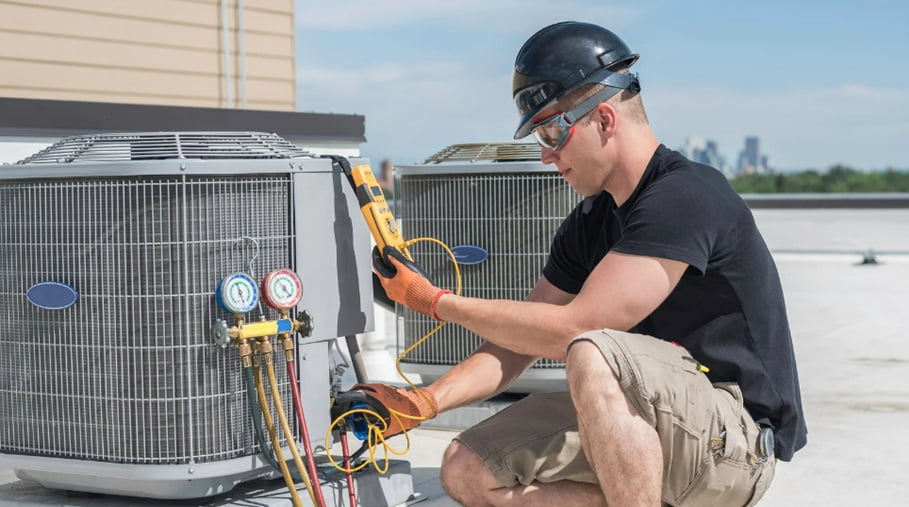
Industrial HVAC systems are pivotal in maintaining a productive and safe environment in extensive facilities. When it’s time for replacement, it’s crucial to approach the process with precision to avoid common pitfalls. The focus on industrial HVAC replacement in Oklahoma City highlights the importance of expert handling to guarantee efficiency and longevity.
Understanding the Specific Needs
One of the primary mistakes facilities make during HVAC replacement is failing to assess their specific needs fully. Each industrial environment has unique requirements based on size, operation type, and climate conditions. A careful evaluation can help select a system that meets current demands and accommodates future growth. Consulting with professionals who provide mechanical services in Oklahoma City can offer valuable insights into the best options.
Importance of Proper Sizing
Another standard error is improper sizing of the HVAC system. Both undersized and oversized systems can lead to inefficiencies. An undersized system may need help maintaining desired temperatures, while an oversized system can cycle on and off too frequently, leading to increased wear and tear. Conducting a detailed load analysis is essential to determine the appropriate capacity for the facility.
Prioritizing Energy Efficiency
In today’s energy-conscious world, selecting an energy-efficient HVAC system is more important than ever. Newer models often offer advanced features that significantly reduce energy consumption. This not only lowers operational costs but also supports sustainability initiatives. Integrating technologies such as energy recovery ventilation can further enhance efficiency.
Ensuring Quality Installation
The installation phase is critical to successfully operating a new HVAC system. Poor installation can negate the benefits of even the most advanced systems. Working with experienced technicians who adhere to industry standards and best practices is essential. Regular training and certification updates for installers can make a significant difference.
Planning for Maintenance
Post-installation, a robust maintenance plan is vital for extending the lifespan of the HVAC system. Regular inspections, filter changes, and system diagnostics can prevent minor issues from escalating into major problems. Establishing a maintenance schedule with professionals ensures the system remains in peak condition, contributing to uninterrupted industrial operations.
Leveraging Technological Advancements
With rapid advancements in HVAC technology, it’s beneficial to consider systems incorporating innovative technology. Features like remote monitoring and automated diagnostics can provide real-time insights and alerts, allowing for proactive maintenance and adjustments. This can lead to improved performance and reduced downtime.
Conclusion
Avoiding common mistakes in industrial HVAC replacement involves careful planning, informed decision-making, and collaboration with experts. By focusing on system needs, proper sizing, energy efficiency, quality installation, and ongoing maintenance, industries can ensure their HVAC systems contribute positively to operational goals. As facilities evolve, embracing new technologies and methodologies will be vital to maintaining a competitive edge.
Frequently Asked Questions
1. Why is proper sizing important in industrial HVAC replacement?
Proper sizing of an HVAC system is crucial because both undersized and oversized systems can lead to operational inefficiencies. An undersized system may not adequately heat or cool a facility, while an oversized system can cycle too frequently, causing increased wear and tear. A detailed load analysis helps determine the appropriate size, ensuring optimal performance and energy efficiency.
2. How does energy efficiency benefit industrial HVAC systems?
Energy-efficient HVAC systems reduce operational costs by consuming less energy, which also helps in lowering the facility’s carbon footprint. These systems often include advanced technologies that enhance performance and sustainability, aligning with modern energy conservation goals.
3. What role does maintenance play after HVAC replacement?
Regular maintenance is essential to extend the lifespan of a new HVAC system. It includes inspections, filter changes, and diagnostics to catch and address issues early on. A well-maintained system operates more efficiently and reliably, reducing the risk of unexpected downtime.


 The Benefits of a Fire Pit for Year-Round Outdoor Living
The Benefits of a Fire Pit for Year-Round Outdoor Living  Top Security Features to Look for in a Garage Door
Top Security Features to Look for in a Garage Door  Unveiling the Beauty of Outdoor Lighting with LNG Landscapes in Minnesota
Unveiling the Beauty of Outdoor Lighting with LNG Landscapes in Minnesota  Living the Corvallis Life: Exciting Experiences for Residents and Travelers
Living the Corvallis Life: Exciting Experiences for Residents and Travelers  What Is It Like to Live in St. George, UT? A Neighborhood Guide
What Is It Like to Live in St. George, UT? A Neighborhood Guide  Retire in Style: Why Sarasota Tops the List for Active Adult Living
Retire in Style: Why Sarasota Tops the List for Active Adult Living  The Role of Minimalist Lighting in Modern Interior Design: Trends and Functional Analysis
The Role of Minimalist Lighting in Modern Interior Design: Trends and Functional Analysis  Comprehensive Guide to Mold Removal in Hunterdon County: Safeguarding Your Home and Health
Comprehensive Guide to Mold Removal in Hunterdon County: Safeguarding Your Home and Health